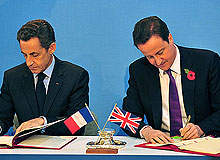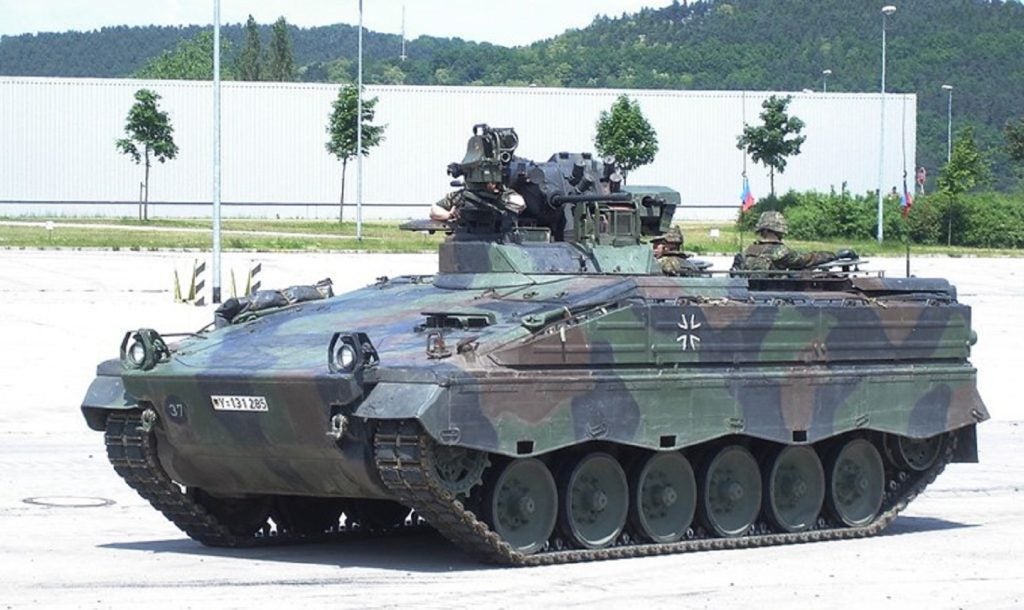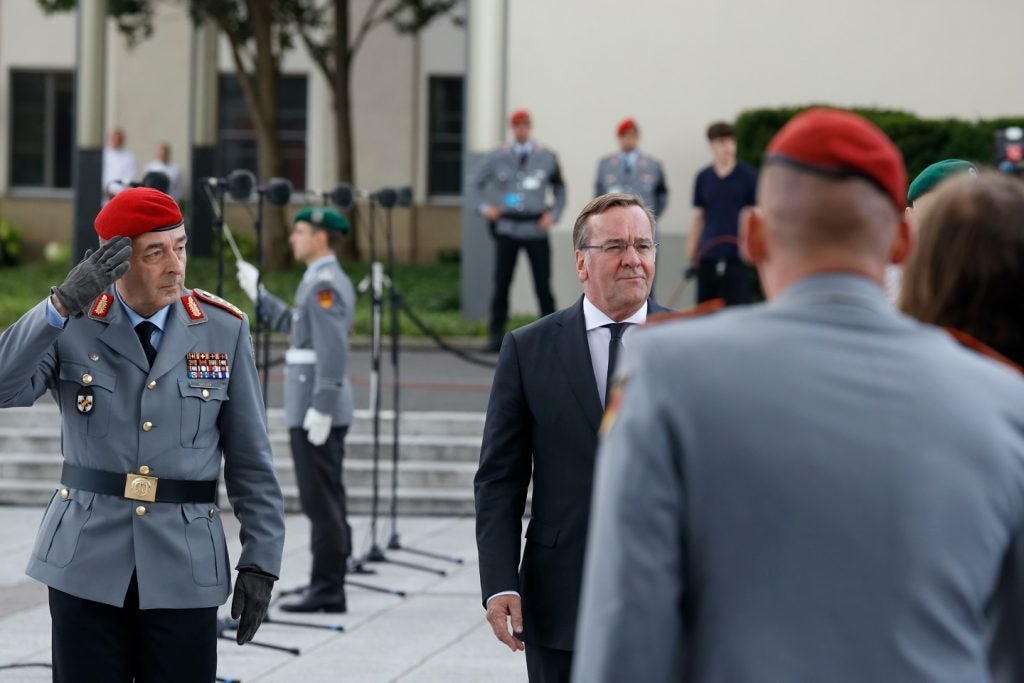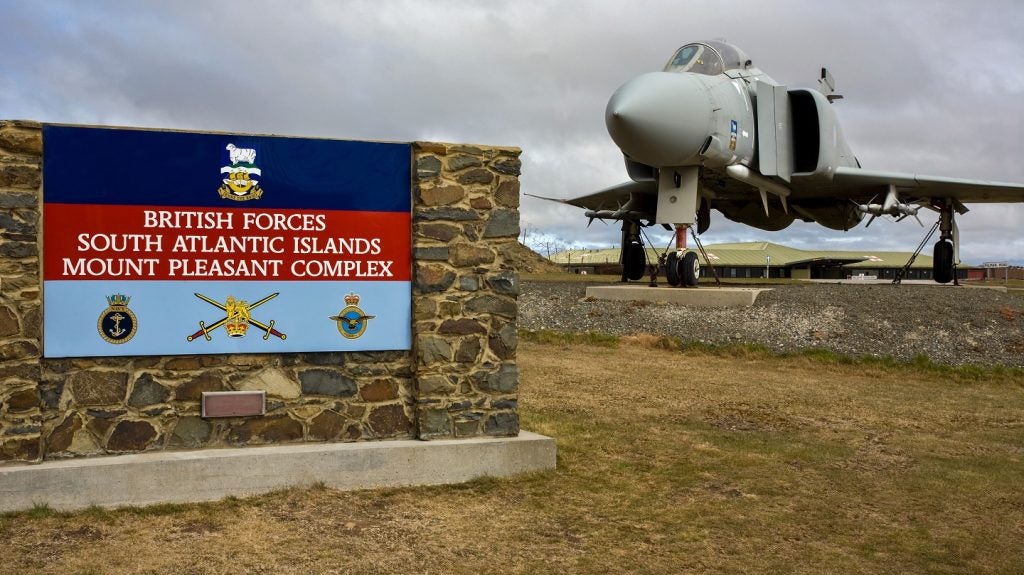
Widespread budget cuts to public services and last year’s Strategic Defence and Security Review have led to spates of redundancies for military personnel and the axing of various vehicles and equipment. Amidst criticism, the UK has been left unable to launch a full-scale land operation on its own and will be without a carrier fleet until the completion of the first Queen Elizabeth class aircraft carrier in 2020.
In an attempt to resolve these issues, the notion of a joint force was floated and in November 2010, the UK and France signed a landmark agreement to increase and improve their military cooperation.
Carrying each other
Under the cooperative deal, the countries’ respective aircraft carriers, HMS Prince of Wales and Charles de Gaulle, will alternate refit times in order to allow both countries to have a presence at sea at all times. HMS Prince of Wales, the second Queen Elizabeth class carrier due to be completed in 2023, will consequently be converted to allow both French and US aircraft to fly-off, increasing the carrier’s versatility. Also included in the revised cooperation is the establishment of a Rapid Reaction Force, thought to include some 5,000 troops, which will serve both nations.
An integral element of the cooperation is, however, yet to be decided. An important point of debate in last year’s UK elections, which saw a Conservative and Liberal Democrat coalition take victory, was the future of Trident, the UK’s nuclear deterrent program. Estimated to cost approximately £2bn per year, equivalent to around 5.5% of the UK’s total defence budget, the Trident program has proven to be a point of particular contention.
Ultimately, Prime Minister David Cameron announced a delay of at least six years to a decision on the future of Trident, as the life of the Vanguard class submarines which maintain the UK’s nuclear deterrent was extended until 2016.
See Also:
Maintaining the deterrent
Under existing cooperation agreements, France and the UK will share nuclear facilities and develop nuclear weaponry together. Whilst the planning and development of such weaponry will still take place within the UK, testing will now take place in France utilising technology that can adequately test missiles without any need for detonation.
How well do you really know your competitors?
Access the most comprehensive Company Profiles on the market, powered by GlobalData. Save hours of research. Gain competitive edge.

Thank you!
Your download email will arrive shortly
Not ready to buy yet? Download a free sample
We are confident about the unique quality of our Company Profiles. However, we want you to make the most beneficial decision for your business, so we offer a free sample that you can download by submitting the below form
By GlobalDataHowever, certain politicians believe that significant savings could be made if this agreement was extended to include the entire Trident program. Liberal Democrat defence minister Nick Harvey has called for a jointly developed and run Anglo-French nuclear deterrent.
Speaking to The Guardian last month, Harvey announced that his proposals had been warmly received by French defence experts and the UK will have to decide on a Trident replacement by 2016, after the next general election. Harvey argues it to be feasible that a permanent at-sea submarine patrol in conjunction with the French could be established, adding that “over a 25- to 30-year cycle, the potential is to save many billions of pounds.”
More cooperation still needed
In spite of the landmark treaty, there is growing opinion that there is still not enough being done to strengthen cooperation between neighbouring forces and this is backed by the latest report from the Centre for European Reform (CER). Entitled ‘Surviving Austerity: The case for a new approach to EU military collaboration’ and compiled by CER director of foreign policy and defence Tomas Valasek, the report extols the benefits of enhanced collaboration and pleads for increased cooperation between EU member states.
“The vast majority of defence euros, pounds or kroner are spent by individual governments building national forces and equipping them, mostly with weapons of domestic provenance. This is a very wasteful way to build armed forces,” argues Valasek, citing the US as an example of a military that can benefit greatly from economies of scale because of the size of its operation and adding his belief that EU countries spend more on multiple back offices and commands, while also subsidising too many unviable defence companies.
Savings could invariably be made with economies of scale and reduced maintenance costs should more countries adopt cross border co-operation in the forms of shared maintenance contracts, training and education, sharing of infrastructure and the creation of joint military units, much like the Joint Rapid Reaction Force established by the UK and France.
Taking examples from corporations
The report also argues that if European armies were corporations, widespread mergers would already have occurred to combine operations, with Valasek stating: “Allies on this side of the Atlantic have two alternatives: either they bolster military strength through closer co-operation and partial integration, or face the prospect of not having enough force to intervene in situations where key European interests or principles are under threat.”
Although military cooperation cannot compensate for reduced defence budgets, as is the case throughout Europe, the CER report did conclude that pooling and sharing of military resources can offset the impact of budgetary cuts. Structural pooling in particular held “particular promise of significant savings.”
Structural pooling has been widespread throughout Europe, with the Netherlands and the UK establishing a joint amphibious force that featured deployable land headquarters in Germany, shared naval training logistics with Belgium and an F-16 expeditionary wing with Denmark and Norway. Costs were significantly reduced and integration was promoted. Elsewhere in Europe, particularly in the Baltic states, regional tensions have been eased through the use of pooling.
Impact on defence companies
Any notion of increased cooperation is likely to impact upon defence companies who may be the favoured producer for particular equipment. Pooling and sharing of equipment will mean a reduced amount of procurement made by countries, meaning that tenders and contracts will inevitably fall. The UK-France cooperation treaty has seemingly made note of this, with a clause urging both sides to purchase more equipment from each other to enhance cooperation and, as an effect, Valasek argues that France will now have to “stop shielding its defence companies from UK competition.”
Another key example of this is the Sweden-Norway relationship, which was strained by Norway’s decision to support the US-made F-35 Joint Strike Fighter rather than the Swedish-made Gripens, with Sweden alleging that its partner state had failed to acknowledge the needs of the Nordic defence industry. Should French companies benefit from the newly-formed UK-France treaty, Valasek notes his opinion that some sections of the British defence establishment may reconsider supporting the treaty.






